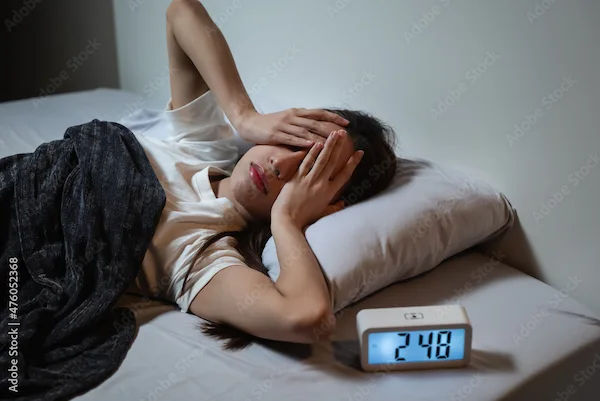Schizophrenia And Sleep Disruption: Understanding The Link
Explore the connection between schizophrenia and sleep disruption. Learn how this mental health condition affects sleep patterns and discover strategies to manage sleep disturbances.

Written by Dr.Sonia Bhatt
Last updated on 3rd Jul, 2025

Introduction
Schizophrenia is a complex mental health condition that affects how a person thinks, feels, and behaves. It’s often misunderstood, and one of the lesser-known challenges of living with schizophrenia is the disruption it can cause to sleep. People with schizophrenia often experience various sleep disturbances, which can make managing their symptoms even more difficult. In this article, we’ll explore the relationship between schizophrenia and sleep disruption, the underlying causes, and provide practical advice on how to improve sleep quality for those affected.
The Link Between Schizophrenia and Sleep Disruption
Sleep problems are very common for people with schizophrenia, with studies showing that up to 80% with the condition struggle with their sleep. These issues can range from trouble falling asleep or staying asleep to waking up too early or having a sleep that just doesn’t feel restful. Sleep quality can be significantly affected, making it even harder to manage daily life.
So, why does schizophrenia cause such sleep issues? Several factors can contribute to the link between schizophrenia and sleep disruption:
The Biological Mechanisms of Schizophrenia
Schizophrenia affects the brain's chemical balance, especially with neurotransmitters like dopamine, serotonin, and glutamate. These chemicals are important for regulating mood, thinking, and sleep. When out of balance, it can affect the body’s natural sleep-wake cycle, or circadian rhythm, which often leads to sleep problems. This is why people with schizophrenia might struggle with things like insomnia or feel overly sleepy during the day.
Medications Used to Treat Schizophrenia
Many of the medications prescribed to manage schizophrenia can also affect sleep in different ways. Some antipsychotics can make people feel drowsy, which might lead to sleeping too much during the day. On the other hand, certain medications can cause insomnia, making it hard to fall asleep or stay asleep. Others might trigger vivid dreams or even nightmares. While these medications are essential for managing the symptoms of schizophrenia, their side effects can sometimes make sleep problems even more difficult to handle.
Psychological Factors
Schizophrenia often brings with it symptoms like paranoia, anxiety, and hallucinations, which can make it difficult for someone to unwind and get a good night's sleep. The constant mental and emotional strain can leave the mind racing, making it hard to relax enough to fall asleep in the first place. On top of that, many people with schizophrenia experience more fragmented sleep, waking up multiple times throughout the night, which can leave them feeling tired and unrested the next day.
Co-occurring Conditions
Sleep disturbances in schizophrenia may be compounded by other mental health issues, such as depression or anxiety. These conditions, which are often present in individuals with schizophrenia, can further disrupt sleep and increase the difficulty of managing the condition overall.
How Sleep Disruption Impacts People with Schizophrenia
Chronic sleep disturbances can significantly affect the quality of life for individuals with schizophrenia. The impact is more than just feeling tired during the day – it can exacerbate other symptoms of the condition and make it harder to manage the illness. Here are a few ways sleep disruption affects individuals with schizophrenia:
Worsening Cognitive Function: Poor sleep can affect memory, concentration, and problem-solving abilities, making it harder for individuals with schizophrenia to process information and complete daily tasks.
Increased Risk of Relapse: Sleep deprivation has been linked to increased vulnerability to psychotic episodes. A lack of restful sleep may trigger or worsen the severity of schizophrenia symptoms, leading to more frequent or intense hallucinations or delusions.
Mood and Behavior Issues: Sleep disruption can also worsen mood, causing irritability, frustration, and heightened emotional sensitivity, which can affect relationships and social interactions.
Reduced Quality of Life: Sleep disturbances in schizophrenia can lead to greater social isolation, reduced ability to work or perform everyday tasks, and an overall decrease in life satisfaction.
Actionable Tips for Improving Sleep with Schizophrenia
Sleep disturbances are common in individuals with schizophrenia, but there are effective ways to improve sleep quality. By adopting healthy sleep habits, making necessary medication adjustments, and incorporating lifestyle changes, significant improvements can be achieved. Here are some practical tips to manage sleep disruption effectively:
1. Practice Good Sleep Hygiene
Sleep hygiene refers to the habits and practices that promote better sleep. For individuals with schizophrenia, improving sleep hygiene can be a simple yet effective strategy. Here are some sleep hygiene tips:
Stick to a Regular Sleep Schedule: Go to bed and wake up at the same time every day, even on weekends. This helps regulate your body’s internal clock and improve sleep quality.
Create a Relaxing Bedtime Routine: Engage in calming activities before bed, such as reading, listening to soft music, or practising deep breathing exercises. Avoid activities that could be stimulating, like watching TV or using a phone.
Limit Caffeine and Stimulants: Avoid consuming caffeine or nicotine close to bedtime, as these can interfere with your ability to fall asleep.
Make Your Sleep Environment Comfortable: Keep your bedroom dark, quiet, and cool to encourage better sleep. Consider using earplugs, an eye mask, or a white noise machine if needed.
Limit Naps During the Day: While it’s tempting to nap if you’re not sleeping well at night, long naps can interfere with your ability to sleep at night. If you need to nap, try to limit it to 20-30 minutes.
2. Medication Management
Work closely with your healthcare provider to monitor and adjust any medications that may be affecting your sleep. Some antipsychotic medications may cause sedation or wakefulness, so it’s essential to discuss any sleep concerns with your doctor. They may recommend:
Medication adjustments: Changing the dosage or trying a different antipsychotic medication with fewer sleep-related side effects.
Sleep aids: In some cases, a short-term use of medications specifically for sleep, like melatonin or a prescription sleep aid, may be helpful. However, these should be used under the guidance of a healthcare professional.
Monitoring side effects: Regularly evaluate how medications are affecting your sleep and overall well-being.
3. Incorporate Relaxation Techniques
Stress and anxiety are common in schizophrenia, and these factors can worsen sleep disruptions. Practising relaxation techniques may help calm the mind and make it easier to fall asleep. Consider the following:
Mindfulness and Meditation: Guided relaxation or mindfulness exercises can help you focus on the present moment and calm your racing thoughts before bed.
Deep-Breathing Exercises: Slow, deep breathing can activate the body’s relaxation response, making it easier to unwind and prepare for sleep.
Progressive Muscle Relaxation (PMR): This involves tensing and relaxing each muscle group in the body to release physical tension and promote relaxation.
4. Exercise Regularly
Regular physical activity can really help improve sleep quality by reducing stress and anxiety and helping your body maintain a more balanced sleep-wake cycle. However, it’s important to be mindful of when you exercise. Working out too close to bedtime can actually make it harder to fall asleep. Aim for at least 30 minutes of moderate exercise during the day, but try to finish your workout at least 3 hours before you plan to go to bed. This way, you’ll get the sleep benefits without disrupting your rest.
5. Seek Support from a Mental Health Professional
Dealing with both schizophrenia and sleep disturbances can be overwhelming. If sleep problems persist, consider seeking help from a sleep specialist or mental health professional. Cognitive Behavioral Therapy for Insomnia (CBT-I) is an evidence-based treatment that has been shown to be effective in treating sleep disorders, even in people with schizophrenia.
Conclusion
Sleep disruption is a major challenge for individuals with schizophrenia, affecting both mental and physical health. By understanding the link between schizophrenia and sleep problems and implementing effective strategies, it's possible to improve sleep quality and overall well-being. Prioritising good sleep hygiene and seeking professional help when needed can make a big difference in managing schizophrenia effectively.
With the right tools and support, managing the challenges of schizophrenia and sleep disruptions becomes more achievable. If you’re struggling with sleep, don’t hesitate to talk to your doctor or mental health professional about the best strategies for you. Taking small steps toward better sleep can significantly enhance your overall health and quality of life.
Consult Top Sleep Medicine Specialist
Consult Top Sleep Medicine Specialist

Dr. Suresh G
General Physician/ Internal Medicine Specialist
25 Years • MBBS, MD
Bangalore
Apollo Clinic Bellandur, Bangalore
(225+ Patients)

Dr. Priya Sharma
Pulmonology/critical Care Specialist
9 Years • DM (PULMONARY MEDICINE), DNB, EDARM, MNAMS
Delhi
Apollo Hospitals Indraprastha, Delhi

Dr. Arjun Ramaswamy
Pulmonology Respiratory Medicine Specialist
9 Years • MD (RESPIRATORY MEDICINE), DM (PULMONARY MEDICINE, CRITICAL CARE AND SLEEP MEDICINE)
Mumbai
Apollo Hospitals CBD Belapur, Mumbai
(75+ Patients)

Dr. M S Kanwar
Respiratory Medicine/Lungs Transplants
47 Years • MBBS, MD, DNB , MNAMS, FPGC (Austria), FCCP (USA), FAMS
Delhi
Apollo Hospitals Indraprastha, Delhi
(100+ Patients)

Dr. Shiba Kalyan Biswal
Pulmonology Respiratory Medicine Specialist
18 Years • MBBS,MD,DM(AIIMS Delhi)
Gurugram
APOLLO SUGAR CLINICS GURUGRAM, Gurugram




